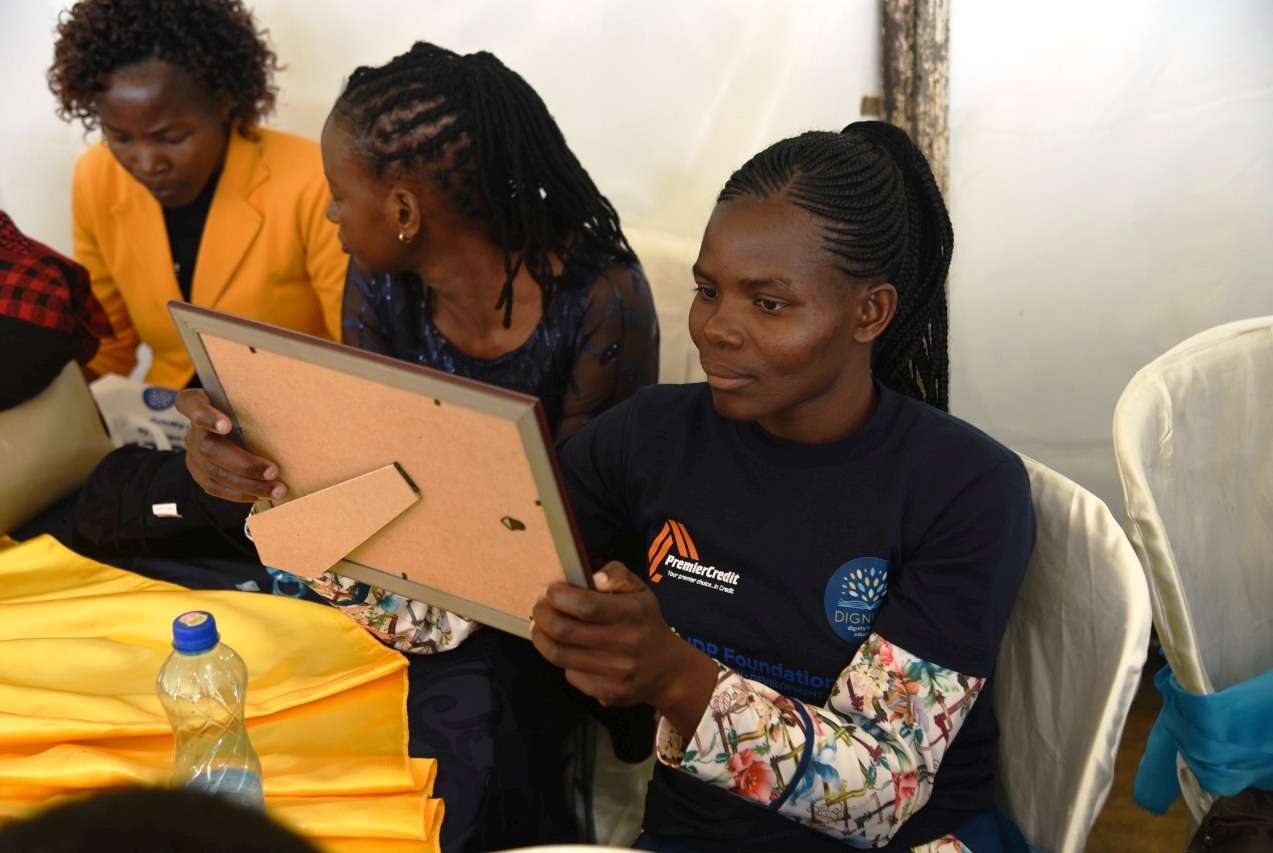In her welcoming speech to the graduands, partners and guests, Dignitas Executive Director Madam Deborah Kimathi thanked IDP leadership and Premier Credit Ltd for the role they have played in ensuring the programme was a big success. He thanked Premier Credit leadership for extending affordable credit facilities to participating schools. She further thanked the graduands for taking their studies seriously and urged them to put into practice the amazing skills acquired during the training to transform the lives of not only the pupils but the entire society
The Ongoza Initiative held a colourful graduation ceremony last Friday for teachers who had undergone rigorous eight months of training under the partnership of Innovation Development Progress (IDP) Foundation, Dignitas and Premier Credit Ltd. The 210 teachers including school directors from 68 schools received training in basic education. The Ongoza Initiative’s main objective is to raise the quality of education in slum areas.
The training which was offered by Dignitas began in April 2022 and culminated in a colourful graduation ceremony where teachers and school directors showcased what they had learned. According to the programme, selected teachers were taught better ways of delivering the curriculum to the learners while directors and school managers undertook courses on general financial literacy and managerial skills. The programme targeted schools and children from vulnerable communities.
Premier Credit representative Mr Barnes Orlando said they are ready to offer affordable loans to schools as well as individual teachers under the programme to ensure they grow financially. He thanked schools which have already opened accounts with Premier Credit Ltd and urged others to do so to enjoy affordable loan facilities
In her welcoming speech to the graduands, partners and guests, Dignitas Executive Director Madam Deborah Kimathi thanked IDP leadership and Premier Credit Ltd for the role they have played in ensuring the programme was a big success. He thanked Premier Credit leadership for extending affordable credit facilities to participating schools. She further thanked the graduands for taking their studies seriously and urged them to put into practice the amazing skills acquired during the training to transform the lives of not only the pupils but the entire society.

In a speech read on his behalf by Edwin Saka, the Chief guest Harun Yusuff who is the CEO of the National Commission for Nomadic Education in Kenya (NACONOK) thanked the partners and sponsors of the programme for ensuring even vulnerable pupils have access to basic education. He assured them of NACONOC’s support in ensuring the promotion, coordination and provision of quality education and training not only for nomadic communities but also for vulnerable children in slum areas in our cities.
Mr Saka, the NACONOK Chairman also promised the sponsors and partners in the Ongoza programme their total support to ensure future training programmes become a reality and a big success. Stephen Caleb Opuni who is the Country Director for the IDP Foundation in Ghana in his address reiterated that education is key to conquering many of the world’s greatest challenges and that everyone should have equal access to educational opportunities to break the cycle of poverty.
He reiterated that IDP will continue to support educational programmes, partnerships and collaboration to ensure the provision of quality education to the most marginalized populations and to ensure education for all.
Premier Credit representative Mr Barnes Orlando said they are ready to offer affordable loans to schools as well as individual teachers under the programme to ensure they grow financially. He thanked schools which have already opened accounts with Premier Credit Ltd and urged others to do so to enjoy affordable loan facilities.
While congratulating the graduands, the Alternative providers for Basic Education and Training (APBET) Coordinator Mr Meshack Adiedo asked the school directors to ensure that they comply with government registration and other regulations to ensure they smoothly continue offering basic education to thousands of learners and to compliment the national government.
He further urged the government to speed up the registration process of private schools saying there are over 2,000 schools in Nairobi, Mombasa and Kisumu counties offering basic education and training. He said the role of APBET cannot be gainsaid as the institutions have effectively complemented public schools towards ensuring Kenyan children have access to basic education as envisioned in the basic education act, 2013 and the Constitution of 100% transition.
Unified ABIPET Schools Association Kenya (UASA-K) chairman Mr Moses asked the school directors to ensure they put into practice what they have learned during the training and thanked the sponsors and the partners of the programme for the noble initiative.
The School directors on their part thanked the sponsors and partners saying they have gained massively and are now well equipped with managerial and financial skills to effectively run the institutions. A baseline survey conducted in the 86 schools indicated that 3% of the schools had school improvement plans and by the end of the training, 89% had developed school improvement plans.
The directors also acknowledged that before the training, they used to run the school accounts as personal accounts but after training, they separated school accounts from personal accounts and this they say has given them great financial discipline. According to the baseline survey, only 9% of the schools had extra income-generating activities or projects but upon completion of the training 68% of the schools had initiated income-generating activities such as the sale of school uniforms, swimming classes, running and operating of food kiosks, poultry farming, rental of school premises and hiring out of school buses.
Before the commencement of the training, according to the baseline survey, only 17% of the schools were preparing lesson plans and by the end of the training, 86% of the schools had adopted preparing the lesson plan. Further, at the end of the training, school directors reported that unlike before, they are now able to prepare financial statements and other financial books including salary slips for teachers and non-teaching staff. Teachers also reported great achievements during the training.





